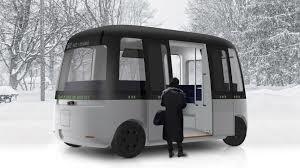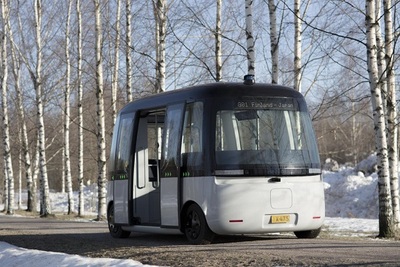RoboSense Provides Cold-Resistant LiDAR to GACHA – First Autonomous Driving Shuttle Bus for All Weather Conditions
 |
SEE ALSO: "They All Look Alike To Me" - Milton Snide, Snide's Remarks
SEE ALSO: Robotic Taxi's Cost Twice Per Mile As Today's Human Driver Taxi's MIT Study Shows
SEE ALSO: Autonomous Vehicle News Archive
SEE ALSO: Big Brother-Like "Birth to Grave" Autonomous Driving Will Take Our Freedom And Kill The Automobile Industry
SEE ALSO: Autonomous Autos Give Bad Guys The Power To End Our Freedom To Go Where We Want When We Want To
Before GACHA, Autonomous Cars Operated Only in Ideal Weather Conditions
March 14, 2019, Shenzhen, China – RoboSense http://www.robosense.ai, a leader in LiDAR perception technology solutions and CES 2019 Innovation Award Honoree, announced today that it has provided cold-resistant all-weather LiDAR for the world’s first autonomous driving shuttle bus for all weather conditions -- GACHA. GACHA is equipped with RoboSense’s advanced cold-resistant 16-beam mechanical LiDAR environment perception system to operate vehicles in harsh winter and other severe weather conditions. The autonomous shuttle bus robo-taxi GACHA was designed in collaboration with Finnish autonomous driving company Sensible 4, who provided superior software for positioning, navigation, and obstacle detection; Japanese company MUJI, who provided excellent expertise in design and user experience; and Chinese company RoboSense, who provided advanced cold resistant LiDAR.
Environment Perception is Huge Task in Extreme Weather Conditions
Environment perception is a huge task facing autonomous vehicle providers who require operation in all-weather conditions. Under extreme weather conditions, the performance of critical sensors, such as LiDARs and cameras, are severely impacted. Low temperatures, such as those in Finland, where winter temperatures can reach as low as -30°C (-22°F), can incapacitate the performance of semiconductor components, while snow and ice covered roads essentially cripple the image algorithms’ ability to determine abstract environment information. In addition, on an extremely cold day, the motor of a multi-layered LiDAR might not even start-up, as well as causing detection accuracy and ranging performance to be diminished. Under these circumstances, RoboSense’s new cold-resistant LiDAR is essential. RoboSense’s cold-resistant LiDAR “sees” a 3D world through emitting and receiving lasers pulses, with point cloud algorithms that accurately recognize obstacles, even in snow and ice. Therefore, LiDAR is the most important sensor when it comes to bringing autonomous driving technology to extremely cold environments.
“When it comes to the GACHA project, engineers from both sides, through close and efficient cooperation, made it possible to let the whole LiDAR system operate steadily in the bitterly code weather in Finland,” said Mark Qiu, COO, RoboSense.
GACHA Robot Bus Fleet Deployed in Finland and Other Countries
RoboSense will be joining Sensible 4 on their first GACHA bus fleet deployment in April for use on public roads, as well as future projects in various cities in Finland and abroad. “I’m pleased that our product has helped Sensible 4 and MUJI’s jointly designed GACHA self-driving shuttle bus solve perception problems in all weather conditions. In the near future, all RoboSense multi-layer LiDAR products will be able to operate in automotive grade low temperatures under -40℃,” said Mark Qiu, COO, RoboSense.
“The RoboSense LiDAR hardware and environment perception algorithms we use are reliable and stable, even at freezing temperatures of tens of celcius degrees below zero,” said Harri Santamala, CEO of Sensible 4. “The GACHA development got started when the Sensible 4 team, working back then with the first generation of robot buses, noticed that they just don’t perform at all, even in light rain, not to mention the typical winter conditions in Finland. Completely autonomous self-driving technology is not here yet. Most self-driving cars can operate only in ideal weather conditions and well-marked roads. This is what Sensible 4 has managed to change through repeated tests in the harsh winter conditions of the Finnish Lapland.”
Since its inception, RoboSense has been providing complete hardware and software LiDAR environment perception solutions for the autonomous driving industry, solving the LiDAR perception challenges for autopilot applications in all scenarios by combining the RS-LiDAR hardware and the proprietary RS-LiDAR-Algorithms. RoboSense is committed to making better products with continuous improvements on automotive grade reliability to fulfill customers’ needs in various applications and conditions.
About RoboSense
RoboSense (Suteng Innovation Technology Co., Ltd.) is a world leading LiDAR environment perception solutions provider. Founded in 2014, RoboSense is headquartered in Shenzhen with branch offices in Beijing, Shanghai, Germany, and the United States. Core R&D engineers are from the world’s top universities and top tech companies. The company is committed to delivering comprehensive LiDAR environment perception solutions. The team has been continuously working on and making innovations in many core technical fields, such as FPGA, LiDAR hardware, and AI algorithms. With customers’ needs in mind, RoboSense provides a variety of bespoke intelligent environment perception LiDAR systems.
RoboSense has currently two product lines, including MEMS solid-state LiDAR and Mechanical LiDAR systems. Customers include the world’s major autonomous driving technology companies, automotive OEMs, and Tier 1 suppliers, etc. RoboSense LiDAR solutions have been widely used in various application scenarios, such as self-driving logistics vehicles, buses, passenger cars, and more. For more information, see http://www.robosense.ai.





